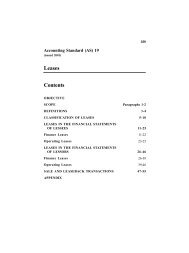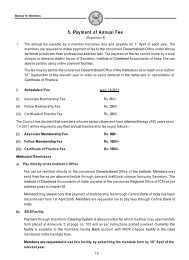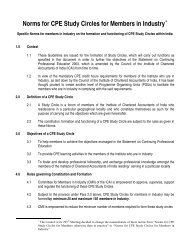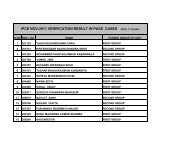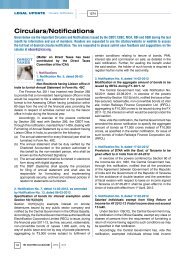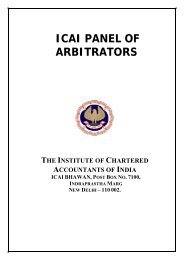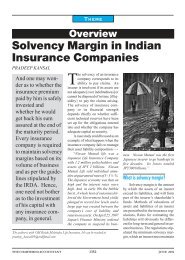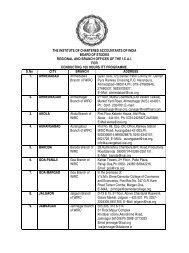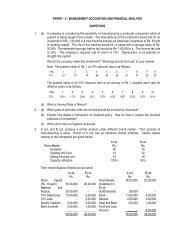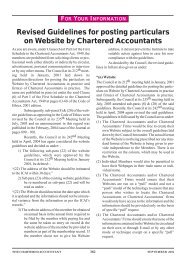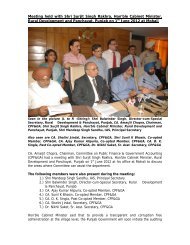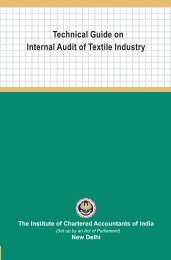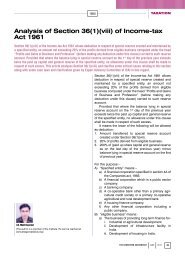The Chartered Accountant
The Chartered Accountant
The Chartered Accountant
Create successful ePaper yourself
Turn your PDF publications into a flip-book with our unique Google optimized e-Paper software.
TAXATION<br />
dia - Held, no - Whether it would be wrong to equate<br />
permanent establishment with a business connection,<br />
since former is for purpose of assessment of income<br />
of a non-resident under a Double Taxation Avoidance<br />
Agreement, and latter is for application of section<br />
9 - Held, yes - Whether income arising out of<br />
turnkey project executed in India would be assessable<br />
in India, only because a non-resident has a permanent<br />
establishment - Held, no - Whether for attracting taxing<br />
statute, there has to be some activity through permanent<br />
establishment and, if income arises without<br />
any activity of permanent establishment, even under<br />
DTAA, taxation liability in respect of overseas services<br />
would not arise in India - Held, yes - Whether in<br />
cases where different severable parts of a composite<br />
contract are performed at different places, principle<br />
of apportionment as recognised by Explanation 1(a)<br />
of section 9(1)(i), can be applied, to determine which<br />
fiscal jurisdiction can tax that particular part of transaction<br />
- Held, yes - Whether location of source of<br />
income within India would render sufficient nexus to<br />
tax income from that source - Held, no - Whether for<br />
section 9(1)(vii) to be applicable, it is necessary that<br />
services provided by a non-resident assessee under a<br />
contract should not only be utilized within India, but<br />
should also be rendered in India or should have such<br />
a live link with India that entire income from fees as<br />
envisaged in article 12 of DTAA becomes taxable in<br />
India - Held, yes - Whether thus, for a non-resident to<br />
be taxed on income for services, such a service needs<br />
to be rendered within India, and has to be a part of<br />
a business or profession carried on by such person in<br />
India - Held, yes - Whether whatever is payable by a<br />
resident to a non-resident by way of fees for technical<br />
services would not always come within purview of<br />
section 9(1)(vii) but it must have sufficient territorial<br />
nexus with India so as to furnish a basis for imposition<br />
of tax - Held, yes - Appellant was a company<br />
incorporated in Japan and engaged, inter alia, in business<br />
of construction of storage tanks as also engineering,<br />
etc. - It entered into an agreement with ‘P’<br />
for setting up a Liquefied Natural Gas receiving storage<br />
and degasification facility in India - Appellant was<br />
to develop, design, engineer and procure equipment,<br />
materials and supplies, to erect and construct storage<br />
tanks of 5 MMTPA capacity - Contract involved offshore<br />
supply and offshore services - Whether since all<br />
activities in connection with offshore supply were carried<br />
out outside India, amounts received/receivable by<br />
appellant from ‘P’ for offshore supply of equipments,<br />
materials, etc., cannot be deemed to accrue or arise<br />
in India - Held, yes - Whether since entire services<br />
had been rendered outside India and had nothing to<br />
do with permanent establishment, amount received/<br />
receivable by appellant from ‘P’ for offshore services<br />
was not liable to tax in India - Held, yes<br />
facts<br />
<strong>The</strong> appellant is a company incorporated in Japan and<br />
is engaged, inter alia, in the business of construction<br />
of storage tanks as also engineering, etc. It formed<br />
a consortium along with various foreign entities including<br />
an Indian company. With the said consortium<br />
members, it entered into an agreement with ‘P’ for setting<br />
up a Liquefied Natural Gas (LNG) receiving storage<br />
and degasification facility in India. <strong>The</strong> contract<br />
envisaged a turnkey project. Role and responsibility<br />
of each member of the consortium was specified separately.<br />
Each of the members of the consortium was<br />
also to receive separate payments. <strong>The</strong> appellant was<br />
to develop, design, engineer and procure equipment,<br />
materials and supplies, to erect and construct some<br />
storage tanks of 5 MMTPA capacities.<br />
<strong>The</strong> contract indisputably involved:<br />
(i) Offshore supply,<br />
(ii) Offshore services,<br />
(iii) Onshore supply,<br />
(iv) Onshore services and<br />
(v) construction and erection.<br />
<strong>The</strong> price was payable for offshore supply and offshore<br />
services in US dollars, and for onshore supply<br />
as also onshore services and construction and erection<br />
partly in US dollars and partly in Indian rupees.<br />
Liability to pay income-tax in India of the appellant,<br />
being doubtful, an application was filed by the appellant<br />
before the Authority for Advance Rulings in<br />
terms of section 241Q (1) raising the following questions<br />
:<br />
1. Whether the amounts, received/receivable by<br />
the appellant from ‘P’ for offshore supply of<br />
equipments, materials, etc., are liable to tax<br />
in India under the provisions of the Act and<br />
India-Japan Tax Treaty and if taxable, to what<br />
extent are the amounts reasonably attributable<br />
to the operations carried out in India and accordingly<br />
taxable in India ?<br />
2. Whether the amounts received/receivable by<br />
the appellant from ‘P’ for offshore services<br />
are chargeable to tax in India under the Act<br />
and/or the India-Japan Tax Treaty and if tax-<br />
THE CHARTERED ACCOUNTANT 989 DECEMBER 2008



